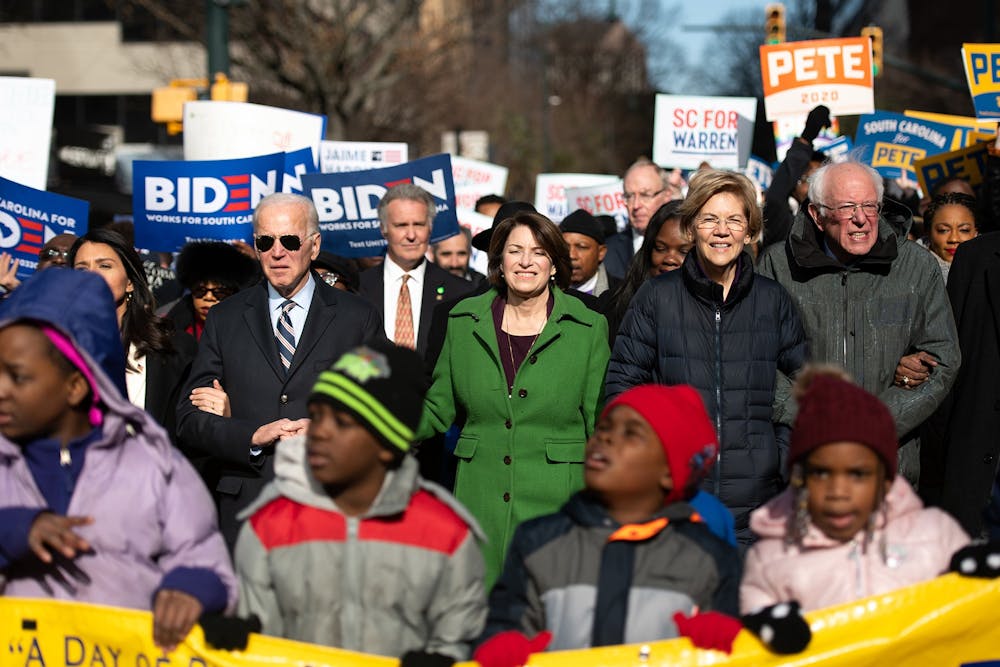For the first time in the the history of the New York Times, its editorial board endorsed two candidates for president: Sen. Amy Klobuchar, D-MN, and Sen. Elizabeth Warren, D-MA. The surprising decision was announced as part of the newest episode of its documentary TV program, "The Weekly," on Sunday.
Citing the "two visions that may define the future of the (Democratic) party," the Times' double-endorsement was supposed to be a nod to who it believed fit each vision best. However, it felt more like a cop-out way to avoid making any real substantive statement. Similarly, the process for researching and deciding on the endorsement felt more like a reality show rather than a serious affair.
Endorsements matter in elections. One study found that Oprah Winfrey's early endorsement of Barack Obama's 2008 presidential campaign may have increased his viability and netted him over one million votes in the primary, aiding in his close win against Hillary Clinton. The Times has built credibility by endorsing a candidate in every presidential election since 1860, when it first recommended Abraham Lincoln in the general election. Especially since it is the third-most circulated newspaper, the Times has an important duty to send a clear message in its endorsement.
The editorial board failed at this. It stressed how there are two visions within the party and about how it has seemingly become "a tussle between moderates and progressives" in the fight for the nomination, yet what does it do about this election-defining struggle?
Seemingly, nothing.
In response to the double endorsement, senior CNN political commentator David Axelrod joked on Twitter, "If I had to choose just ONE newspaper, it would be The New York Times and The Washington Post." This highlights the ridiculousness of a double-endorsement. There was an opportunity to make a statement and decide what the editorial board thought was the ideologically best course for the future of the nation. Instead, it chickened out.
The whole point of making an endorsement is to take a stance on how to vote. In a solid majority of states, including Indiana, you get one vote in the Democratic primary and one vote only. You don't get to double-vote in a primary. The board misunderstood the gravity of an endorsement, which should have used to explain which path the Democratic Party should go down.
And speaking of misunderstanding, one statement from the endorsement of Klobuchar stopped me in my tracks. As pointed out in a viral tweet on Sunday, the board victim-blamed Klobuchar's staff members rather than pointing out her reported abuse toward them as a serious character flaw. Former staff members alleged last year that Klobuchar repeatedly berated them in front of others, insulted them via email and threw physical objects during verbal outburts.
The board's account of the matter begins almost comically, saying that "reports of how Senator Klobuchar treats her staff give us pause." This is where we should expect at least a paragraph dedicated to how her reported disposition might not be a good replacement to Trump's, but instead it bizarrely ends by saying that the reports "raise serious questions about her ability to attract and hire talented people." The casual victim-blaming was disrespectful and honestly shocking.
Moving past that qualm, it is important to dissect the whole process of the Times' endorsement. After being teased for weeks with clips of candidate interviews, the endorsement culminated as a television special of the board deliberating its decision. Throughout this whole ordeal, I could not help but feel like I was waiting for Trump to pop up out of nowhere and say, a-lá "The Apprentice": "You're fired!"
The board claimed the goal was transparency. Kathleen Kingsbury, the New York Times deputy opinion editor, tweeted on Jan. 9 that candidate interviews were traditionally unrecorded and off the record. She said the board hoped putting the interviews on TV would provide "the most transparent endorsement process to date."
After viewing the episode, however, the decision felt disingenuous. There was scant deliberation, and Kingsbury made the final decision privately in the end.
It all just felt contrived, without sincerity or journalistic integrity. The broken politics caused by Trump's reality-show presidency seemed to be on clear display. Endorsements should not become a game show, and yet the Times succumbed to ratings to put on a spectacle.
Ultimately, the Times editorial board should have just quietly deliberated, talked with a few candidates and chosen the person who best represents its vision of America. Instead, we got a reality show Q&A complete with a pointless double-endorsement that displayed complete cowardice from the paper.
Hopefully 2024 brings more clarity to the Times.
Max Sandefer (he/him) is a sophomore studying Spanish and political science. He is currently a legislative intern on Capitol Hill in Washington, D.C.





